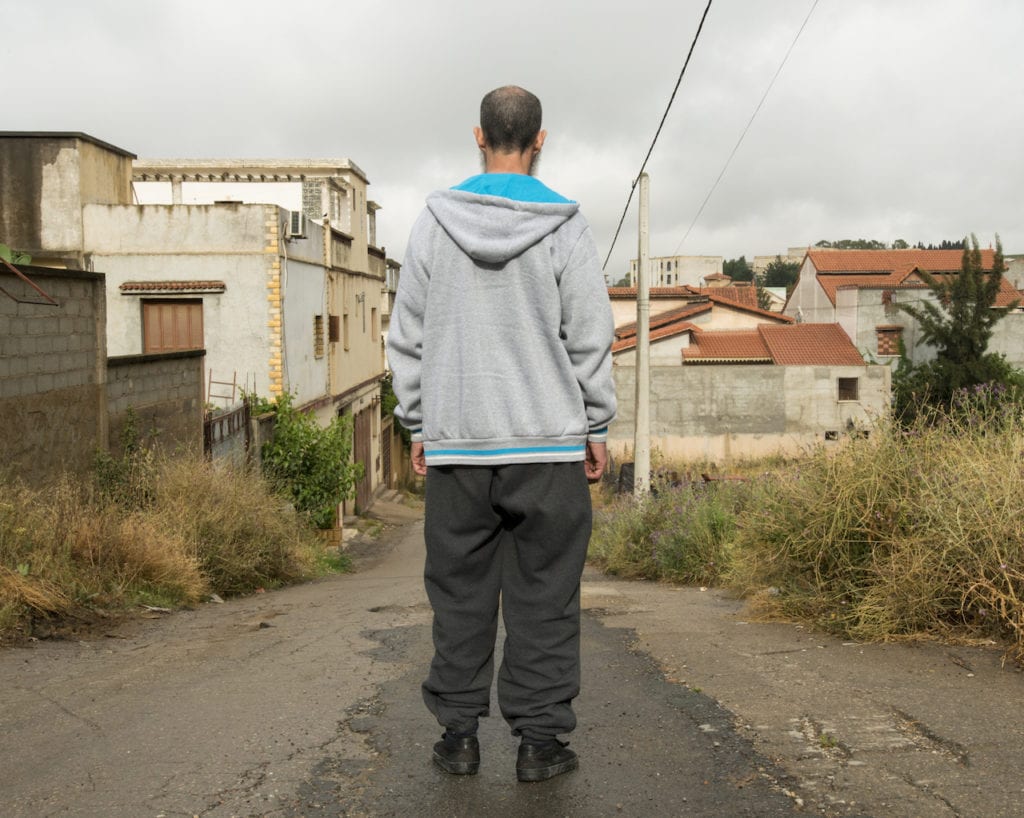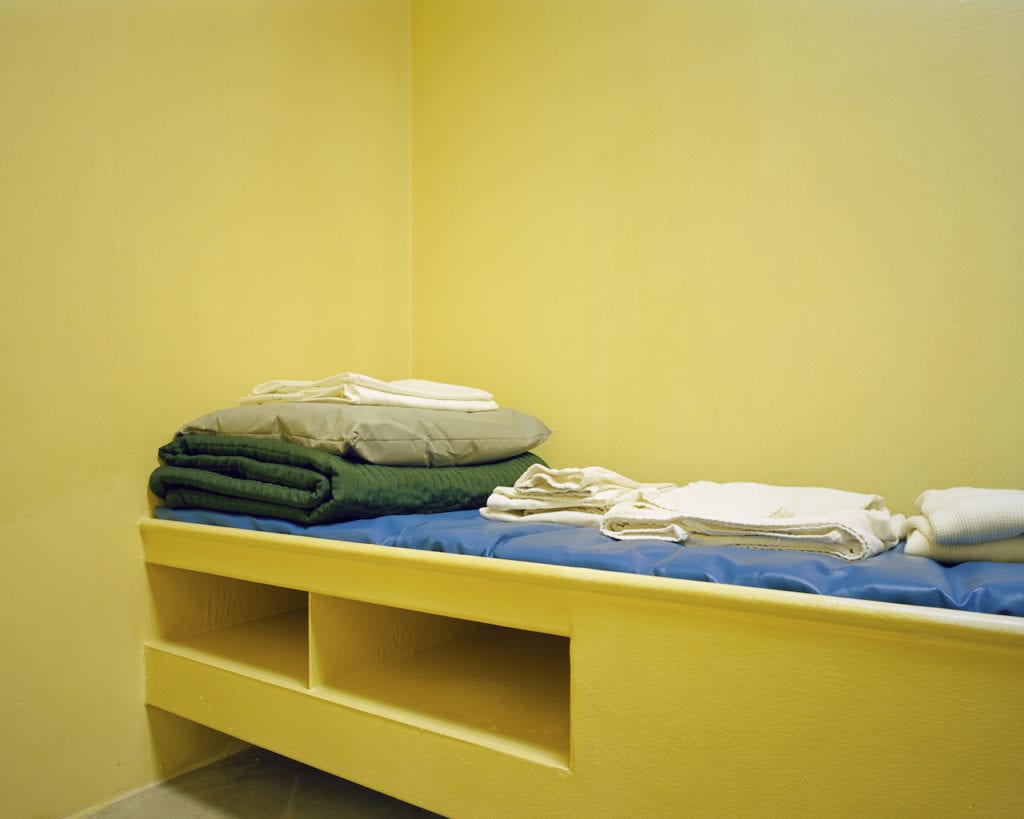“When I first arrived, my military escort said, ‘Gitmo: the best posting a soldier can have. There’s so much fun here!’,” recalls US photographer Debi Cornwall. “So I said, ‘Show me the fun!’”
She had just touched down at Guantánamo Bay naval base, home to the infamous detention centre established in 2002 by US president George W Bush for the interrogation of suspected terrorists, enemy combatants and “extremely dangerous individuals” – “the worst of the worst, they call them” – following the 9/11 attacks. Since then, it has forged a reputation as hell on earth, where men are held for years without charge or legal process, and are often tortured. With 12 years’ experience of working as a wrongful-conviction lawyer, Cornwall began to enquire.
It took nine months, a background check and her signature on a 12-page list of rules before she was granted access. On arrival, she was escorted on a media tour of the empty premises and reminded that any photographs taken would be reviewed “directly from memory cards” and, most importantly, could not show any faces, even partial profiles. “My strategy to photograph this place was to look at only what I was being asked to see,” she says. Her photographs of memorabilia from the gift shop and the recreational areas for the guards’ families could well appear in a Guantánamo-esque summer camp brochure.

Djamel (Algeria). Held 11 years, 11 months, 18 days; cleared 2008 & 2009; released 2013; charges never filed in the US; acquitted and exonerated at trial in Algeria. 2015. From the book Welcome to Camp America: Inside Guantanamo Bay © Debi Cornwall
She has collected the pictures into a photobook published by Radius, Welcome to Camp America, Inside Guantánamo Bay, which asks its readers to confront the neglect of human rights that has become the ‘new normal’. “In military terminology, the men held here are detainees, not prisoners,” says Cornwall. “Prisoners would be entitled to the protections guaranteed by international law under the Geneva Conventions. Detainees are not.”
The book has a dual narrative. The first centres on citations of an affidavit from a US court case, authored by a man who was brutally assaulted while being ‘extracted’ from a prison cell, edited by Cornwall to reveal his identity only later in the book. The second is the visual narrative told in sterile, commercial-like photographs. The ‘fun’, so to speak. The juxtaposition of this dark humour renders the reader conflicted, uneasy and curious. The design is immersive.
Excerpts of formerly classified documents are concealed by a fold- out flap, allowing a “peek at officialdom” but which also engage the reader “in awareness of whether you want to look at the show. You’re welcome to flip past it but you are aware that you chose not to look.”
There are also photographs of 14 of the camp’s former inmates who have since been relocated to countries of different cultures and languages, which appear as loose inserts that may end up slotted in arbitrarily between any given pages, or could be lost without care. “For me, the book is the most comprehensive iteration of the work because I’m able to create a mood and a disorientation, but also place the official messaging in a deeper context,” says Cornwall.
All of the editorial text appears in both English and Arabic. “It’s critically important for me to be in dialogue with the population most impacted by the War on Terror policies.”

Show cell, Camp 6, 2015. From the book Welcome to Camp America: Inside Guantanamo Bay © Debi Cornwall
Debi Cornwall is signing copies of Welcome to Camp America: Inside Guantánamo Bay at Paris Photo at 2pm, 11 November on the Steven Kasher stand https://programme.parisphoto.com/en/book-signings.htm https://programme.parisphoto.com/en/photobook-awards.htm
www.debicornwall.com Welcome to Camp America: Inside Guantánamo Bay by Debi Cornwall is published by Radius Books, $45 radiusbooks.org This article first appeared in the November issue of BJP, available via www.thebjpshop.com
She had just touched down at Guantánamo Bay naval base, home to the infamous detention centre established in 2002 by US president George W Bush for the interrogation of suspected terrorists, enemy combatants and “extremely dangerous individuals” – “the worst of the worst, they call them” – following the 9/11 attacks. Since then, it has forged a reputation as hell on earth, where men are held for years without charge or legal process, and are often tortured. With 12 years’ experience of working as a wrongful-conviction lawyer, Cornwall began to enquire.
It took nine months, a background check and her signature on a 12-page list of rules before she was granted access. On arrival, she was escorted on a media tour of the empty premises and reminded that any photographs taken would be reviewed “directly from memory cards” and, most importantly, could not show any faces, even partial profiles. “My strategy to photograph this place was to look at only what I was being asked to see,” she says. Her photographs of memorabilia from the gift shop and the recreational areas for the guards’ families could well appear in a Guantánamo-esque summer camp brochure.

She has collected the pictures into a photobook published by Radius, Welcome to Camp America, Inside Guantánamo Bay, which asks its readers to confront the neglect of human rights that has become the ‘new normal’. “In military terminology, the men held here are detainees, not prisoners,” says Cornwall. “Prisoners would be entitled to the protections guaranteed by international law under the Geneva Conventions. Detainees are not.”
The book has a dual narrative. The first centres on citations of an affidavit from a US court case, authored by a man who was brutally assaulted while being ‘extracted’ from a prison cell, edited by Cornwall to reveal his identity only later in the book. The second is the visual narrative told in sterile, commercial-like photographs. The ‘fun’, so to speak. The juxtaposition of this dark humour renders the reader conflicted, uneasy and curious. The design is immersive.
Excerpts of formerly classified documents are concealed by a fold- out flap, allowing a “peek at officialdom” but which also engage the reader “in awareness of whether you want to look at the show. You’re welcome to flip past it but you are aware that you chose not to look.”
There are also photographs of 14 of the camp’s former inmates who have since been relocated to countries of different cultures and languages, which appear as loose inserts that may end up slotted in arbitrarily between any given pages, or could be lost without care. “For me, the book is the most comprehensive iteration of the work because I’m able to create a mood and a disorientation, but also place the official messaging in a deeper context,” says Cornwall.
All of the editorial text appears in both English and Arabic. “It’s critically important for me to be in dialogue with the population most impacted by the War on Terror policies.”

Debi Cornwall is signing copies of Welcome to Camp America: Inside Guantánamo Bay at Paris Photo at 2pm, 11 November on the Steven Kasher stand https://programme.parisphoto.com/en/book-signings.htm https://programme.parisphoto.com/en/photobook-awards.htm
www.debicornwall.com Welcome to Camp America: Inside Guantánamo Bay by Debi Cornwall is published by Radius Books, $45 radiusbooks.org This article first appeared in the November issue of BJP, available via www.thebjpshop.com

